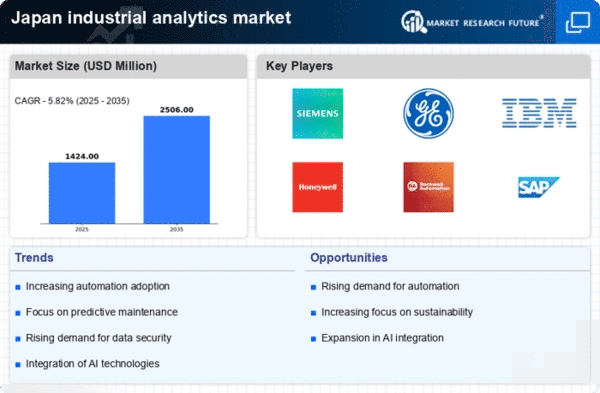Integration of IoT Technologies
The integration of Internet of Things (IoT) technologies is transforming Japan's industrial analytics market. With the proliferation of connected devices, companies can collect vast amounts of data from their operations. This data, when analyzed, provides valuable insights that can lead to improved performance and reduced downtime. The Japanese government has been promoting IoT initiatives, which further supports the growth of the industrial analytics market. It is estimated that the IoT market in Japan will reach $10 billion by 2025, creating a fertile ground for analytics solutions. As organizations leverage IoT data, the demand for advanced analytics tools is expected to rise, driving innovation in the industrial analytics market.
Emphasis on Data Security and Compliance
In the context of the industrial analytics market, data security and compliance have become paramount concerns for Japanese companies. As organizations increasingly rely on data analytics, they must also ensure that sensitive information is protected against breaches and that they comply with regulations. The Japanese government has implemented strict data protection laws, which necessitate the adoption of robust security measures. This focus on security is likely to drive investments in analytics solutions that offer enhanced data protection features. Companies are expected to allocate approximately 20% of their analytics budgets to security measures, indicating a strong commitment to safeguarding their data while utilizing analytics for operational improvements.
Rising Demand for Operational Efficiency
The industrial analytics market in Japan is experiencing a notable surge in demand for operational efficiency. Companies are increasingly seeking ways to optimize their processes, reduce waste, and enhance productivity. This trend is driven by the need to remain competitive in a rapidly evolving market. According to recent data, organizations that implement analytics solutions can achieve efficiency improvements of up to 30%. As a result, investments in industrial analytics technologies are projected to grow significantly, with the market expected to reach approximately $1.5 billion by 2026. This focus on operational efficiency is likely to propel the industrial analytics market forward, as businesses recognize the value of data-driven decision-making.
Investment in Workforce Skill Development
Investment in workforce skill development is emerging as a critical driver for the industrial analytics market in Japan. As organizations adopt advanced analytics technologies, there is a pressing need for skilled professionals who can interpret data and derive actionable insights. Companies are increasingly investing in training programs to upskill their workforce, ensuring that employees are equipped to leverage analytics tools effectively. This focus on skill development is likely to enhance the overall capabilities of the workforce, fostering a culture of data-driven decision-making. It is estimated that organizations will allocate around 15% of their training budgets to analytics-related skill development, thereby supporting the growth of the industrial analytics market.
Growing Need for Real-Time Decision Making
The industrial analytics market in Japan is witnessing a growing need for real-time decision-making capabilities. This need arises as industries become more dynamic. As industries become more dynamic, the ability to analyze data in real-time is crucial for maintaining a competitive edge. Companies are increasingly adopting analytics solutions that provide instant insights, enabling them to respond swiftly to market changes and operational challenges. This trend is particularly evident in sectors such as manufacturing and logistics, where timely decisions can significantly impact efficiency and profitability. The demand for real-time analytics tools is projected to increase, with the market expected to grow at a CAGR of 15% over the next five years, reflecting the urgency for immediate data-driven insights.
















